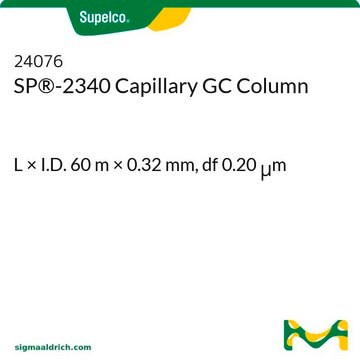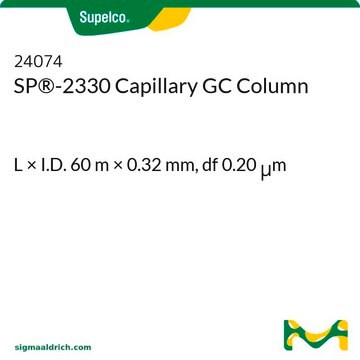24023
SP-2340
L × I.D. 60 m × 0.25 mm, df 0.20 μm
Iniciar sesiónpara Ver la Fijación de precios por contrato y de la organización
About This Item
UNSPSC Code:
41115710
eCl@ss:
32119290
Productos recomendados
material
fused silica
Quality Level
agency
meets requirements for USP G5
parameter
≤25-250 °C temperature (isothermal or programmed)
Beta value
313
df
0.20 μm
technique(s)
gas chromatography (GC): suitable
L × I.D.
60 m × 0.25 mm
matrix active group
Non-bonded; poly(biscyanopropyl siloxane) phase
column type
capillary highly polar
¿Está buscando productos similares? Visita Guía de comparación de productos
General description
SP®-2340 is a cyanopropylsiloxane stationary phase, and has high polarity and temperature resistance.
Application: This non-bonded column offers the highest polarity in its class. As with all general purpose biscyanopropyl columns, it is highly effective for both high and low temperature separations of geometric isomers of fatty acid methyl esters (FAMEs), dioxins, carbohydrates, and aromatic compounds.
USP Code: This column meets USP G5 requirements.
Phase:
USP Code: This column meets USP G5 requirements.
Phase:
- Non-bonded
- Poly(biscyanopropyl siloxane)
- Subambient to 250 °C (isothermal or programmed)
Application
Capillary column coated with SP®-2340 stationary phase may be used in gas chromatographic analysis and separation of cis/trans isomeric fatty acids.
Other Notes
We offer a variety of chromatography accessories including analytical syringes
Legal Information
SP is a registered trademark of Sigma-Aldrich Co. LLC
Elija entre una de las versiones más recientes:
¿Ya tiene este producto?
Encuentre la documentación para los productos que ha comprado recientemente en la Biblioteca de documentos.
Los clientes también vieron
SP 2340 in the glass capillary chromatography of fatty acid methyl esters.
Heckers HF
Journal of Chromatography A, 136 (2), 311-317 (1977)
R H Thompson et al.
Lipids, 16(9), 694-699 (1981-09-01)
Paris of C-24 epimeric sterols have been very difficult to separate by physical emthods. We report here the partial or complete separation of the trimethylsilyl ethers of nine pairs of C-24 epimeric sterols by gas liquid chromatography on a glass
Mikael Harju et al.
Journal of chromatography. A, 1019(1-2), 111-126 (2003-12-03)
Comprehensive two-dimensional gas chromatography (GC x GC) of the 209 polychlorinated biphenyls (CBs) was carried out using a longitudinally modulated cryogenic system (LMCS) and liquid carbon dioxide as cryogen. The effluent from a non-polar column was modulated and further separated
C F Poole et al.
Journal of chromatography. A, 912(1), 107-117 (2001-04-20)
The solvation parameter model is used to study the influence of temperature and composition on the selectivity of nine poly(siloxane) and two poly(ethylene glycol) stationary phase chemistries for open-tubular column gas chromatography. A database of system constants for the temperature
H Heckers et al.
The American journal of clinical nutrition, 31(6), 1041-1049 (1978-06-01)
Fatty acid patterns were determined in 83 brands of margarine, 9 brands of low-calorie margarine and 18 brands of shortening, frying and cooking fat purchased at random from the retail marker in the Federal Republic of Germany in 1973/1974, and
Nuestro equipo de científicos tiene experiencia en todas las áreas de investigación: Ciencias de la vida, Ciencia de los materiales, Síntesis química, Cromatografía, Analítica y muchas otras.
Póngase en contacto con el Servicio técnico









